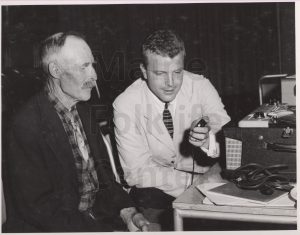Blog #1 – Making Connections
About a month ago, in early June, we were visited by some long-time friends of the Maine Folklife Center. They were here to see our newly renovated space (well, it’s been a year now) and to learn about the things we were doing to build upon the legacy of the Center and its founder, Edward ‘Sandy’ Ives. And yes, I guess they were here to meet me as well.
David Taylor was a student of Sandy’s in the 1970s, and told me about the role that Sandy played as his teacher and mentor. His influence led David to graduate school and a career as a folklorist, and eventually to his current position as External Relations & Program Development Officer at the Library of Congress. Prior to that he was Head of Research and Programs, Head of Acquisitions, and Director of the Field School for Cultural Documentation at the American Folklife Center. Not too shabby, I’d say.
David was accompanied by his wife LeeEllen Friedland, a respected folklorist and ethnographer in her own right. LeeEllen has worked on projects around the world, ranging from studies of African dance to exploring the role that anthropology can play in improving relations between U.S. military troops and communities in some of the world’s hottest hot spots. Like David, LeeEllen says that her work was deeply influenced by Sandy Ives, although this influence was largely through his books and other publications.
The third member of the group had a more personal and less professional relationship with Ives—as his daughter. Sarah Ives Lewis, who now lives in Belfast, was “the one who went to California,” as she had told me in an earlier email. She seemed to inherit a lot of the wanderlust and joie de vivre that folks who knew them say both her father and her mother, Bobby, had in abundance.
As we toured the Folklife Center, I showed them Sandy’s books, which now make up most of the Center’s “library,” and the record collection that was also largely of Sandy’s making. We then sat in the new podcasting studio created in the former home of the Northeast Archives of Folklore and Oral History, now moved to the Library of Congress and UMaine’s Fogler Library. I spoke with them on tape (actually, digital recorder) about Sandy and Bobby, and about their own experiences as folklorists or members of a folklorist family. It was very enlightening for me, as well as an enjoyable conversation.

A second thought is that, in order to accomplish what I want to as Director, and to help the Maine Folklife Center achieve its true potential, I know I need to rely on other people. That is a tough position for me to be in, both because I tend to do things on my own, and because there are few funds available for staff positions here at the Center. We are currently making do with a handful of people borrowed from other departments, fixed-length positions, and work study students. My own time is divided between two administrative positions (MFC and Maine Studies) and my teaching, research and service expectations within the Department of Anthropology.
So that brings me to my final point. Now that I am two years in this position, and have some of the basics taken care of, such as the renovation of our space and the creation of a skeleton crew, I am looking to expand what we are doing here at the Center. I have several projects in the early stages, and others just waiting to take off. But to take advantage of these opportunities I need more help. And some of this, at least, will have to come from people who are willing to be volunteers, at least for now.
I don’t want to get too much into the details of what kinds of work there might be to do, as this first of my blog posts is already near its self-imposed limit. Besides, I’m not even sure what all we need at this point. But just a few of the things we are working on at the moment, or interested in doing, include:
• Setting up an in-house recording and editing studio for creating podcasts and other audio products;
• Developing tools for digitizing recordings made on a variety of vintage equipment, such as wire recorders and acetate disks;
• Finding ways to use materials from the Northeast Archives in educational products, and encouraging others to do so;
• Inventorying our considerable backlist of publications and creating a new e-commerce and membership platform;
• Developing a line of merchandise (clothing, posters, mugs, etc.) that carry the Maine Folklife brand;
• Hosting musicians, artists and others on the UMaine campus, and perhaps at other locations; and
• Developing training programs for community members in oral history and other forms of research.
In addition to these ideas, we are working on a number of research projects, including one to collect life stories in the greater Katahdin region in collaboration with the Millinocket Memorial Library. We could use various assistance with these projects, ranging from grant writing to interviewing, transcribing, and podcast and website creation. If any of these things interest you, and you believe you could contribute some time and energy to the Folklife Center, I would look forward to hearing from you.
And now I am truly over my word limit, so I will end this here. I hope to continue posting blogs every month or so—more at times, but less when things get busy during the academic year. I look forward to hearing from you, whether to respond to my request for help, to offer an idea for a blog, or to ask me something about the Folklife Center and our work. The best way to reach me is by our general email address, folklife “at” maine.edu. Or call me (leave a message if needed) at 207-581-1840.
Thanks, and have a great summer!
– Kreg Ettenger, Director
